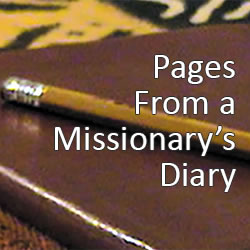
“I don’t know where the inspiration came from,” Bala Krishna told me, “but I freely promised to have all my children baptized and brought up as Catholics, though I myself would remain a Hindu.” Bala Krishna was speaking of the preparation for his Catholic marriage to Mary Poligaru. Pressed further, he said, “Firstly, all religions are one – there is no essential dichotomy between them. But secondly, I also saw that Christianity was more zealous in religious instruction than Hinduism. So I felt that my children would have a light to direct their steps through life if they were Christian.”
The acceptance of Indian cultural symbols into Catholic worship and sacraments made Bala Krishna very happy. His neighbors slapped him on the back in congratulations after seeing Fr. Sean Rainey perform the wedding of his eldest daughter, Nirmala, according to the enculturated Catholic rite, which has traditional Indian rituals and symbols. “They told me that I had taken a blindfold away from their eyes,” he said.
When his daughter Rosema told him that she didn’t want to marry but wished to become a consecrated person to work for the Church, he gladly gave her his blessing. “It is a genuine service,” he explained to me, “a person who lives only for self, wastes a life, but a person who lives for others becomes a full human being.”
Bala Krishna gave recitals of the Bhagavad Gita during the thirteen days of mourning following a Hindu death. One evening he invited me to say a few words to the people gathered there. Afterwards, he surprised me by inviting them to join in singing a Christian hymn, which he led.
When celebrating a Hindu marriage, unlike other pundits, Bala Krishna insists that both spouses have equal responsibility to love and respect one another. “You can’t clap with only one hand,” he says. This could be entirely due to the fair-mindedness of a good man, but it might also indicate the influence that Christian teaching has had on him.
During Hindi Mass on special occasions like Diwali, the festival of lights, Bala Krishna would sit with the choir and lead the hymns. At a religious convention in Lautoka in 1981, he was up at 4:00 a.m. to cook lunch for 400 people attending.
Dialogue is a way of life for him. He wants everyone to be faithful to their own religion and to promote together the search for true humanity. Some Catholics pray that he will be received into the Church. I see it differently. If that happened, he might no longer be able to spread Christ’s message among Hindus. He would no longer be Christ’s Hindu missionary.
